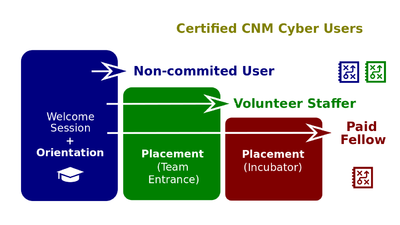Difference between revisions of "Environments for Study"
| Line 1: | Line 1: | ||
| − | [[ | + | [[Environments for Study]] (hereinafter, the ''Lectio'') is the second [[lectio|lesson part]] of the '''[[Learning Management]]''' [[lesson]] that introduces its participants to [[learning environment]]s and related topics. |
[[File:Educaship-pipeline.png|400px|thumb|[[WorldOpp Pipeline]]]]This ''lesson'' belongs to the [[Introduction to Education]] session of the [[CNM Cyber Orientation]]. The ''Orientation'' is the second stage of the [[WorldOpp Pipeline]]. | [[File:Educaship-pipeline.png|400px|thumb|[[WorldOpp Pipeline]]]]This ''lesson'' belongs to the [[Introduction to Education]] session of the [[CNM Cyber Orientation]]. The ''Orientation'' is the second stage of the [[WorldOpp Pipeline]]. | ||
Revision as of 22:12, 1 May 2020
Environments for Study (hereinafter, the Lectio) is the second lesson part of the Learning Management lesson that introduces its participants to learning environments and related topics.
This lesson belongs to the Introduction to Education session of the CNM Cyber Orientation. The Orientation is the second stage of the WorldOpp Pipeline.
Contents
Content
The predecessor lectio is Experiential Studies.
Key terms
- [[]].
 Paths of CNM Cyber Welcome Session graduates
Paths of CNM Cyber Welcome Session graduates
Script
- Whomever you choose to be within the CNM Cyber Workforce, the Orientation will provide you with detailed instructions how to make that real.
Educational Formats is the successor lectio.
Quiz
- Every statement below is split into one true and one false question in the actual exam.
- Self-education is (not) education that is facilitated only by acknowledged schools, colleges, and universities.
- Self-education is (not) education that is organized by a learner him- or her-self.
- Self-education can (not) be active.
- Observation is (not) an example of self-education.
- Observation is (not) an example of narrated education.
- Observation is (not) an example of practical instruction.
- Observation is (not) an example of active learning.
- Lecturing, storytelling, and demonstrating are (not) examples of self-education.
- Lecturing, storytelling, and demonstrating are (not) examples of narrated education.
- Lecturing, storytelling, and demonstrating are (not) examples of practical instruction.
- Lecturing, storytelling, and demonstrating are (not) examples of active learning.
- Hands-on training, directed research, and formative assessment are (not) examples of self-education.
- Hands-on training, directed research, and formative assessment are (not) examples of narrated education.
- Hands-on training, directed research, and formative assessment are (not) examples of practical instruction.
- Hands-on training, directed research, and formative assessment are (not) examples of active learning.
- Discussion, project-based learning, and exploratory research are (not) examples of self-education.
- Discussion, project-based learning, and exploratory research are (not) examples of narrated education.
- Discussion, project-based learning, and exploratory research are (not) examples of practical instruction.
- Discussion, project-based learning, and exploratory research are (not) examples of active learning.
- Discussion, project-based learning, and exploratory research can (not) be self-directed.
